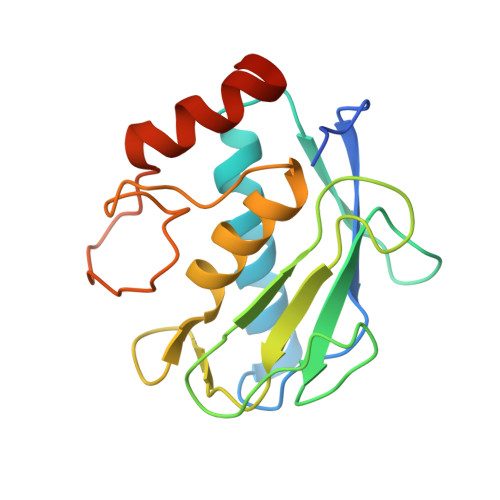Structure-Based Design and Synthesis of Potent and Selective Matrix Metalloproteinase 13 Inhibitors.
Choi, J.Y., Fuerst, R., Knapinska, A.M., Taylor, A.B., Smith, L., Cao, X., Hart, P.J., Fields, G.B., Roush, W.R.(2017) J Med Chem 60: 5816-5825
- PubMed: 28653849
- DOI: https://doi.org/10.1021/acs.jmedchem.7b00514
- Primary Citation of Related Structures:
5UWK, 5UWL, 5UWM, 5UWN - PubMed Abstract:
We describe the use of comparative structural analysis and structure-guided molecular design to develop potent and selective inhibitors (10d and (S)-17b) of matrix metalloproteinase 13 (MMP-13). We applied a three-step process, starting with a comparative analysis of the X-ray crystallographic structure of compound 5 in complex with MMP-13 with published structures of known MMP-13·inhibitor complexes followed by molecular design and synthesis of potent but nonselective zinc-chelating MMP inhibitors (e.g., 10a and 10b). After demonstrating that the pharmacophores of the chelating inhibitors (S)-10a, (R)-10a, and 10b were binding within the MMP-13 active site, the Zn 2+ chelating unit was replaced with nonchelating polar residues that bridged over the Zn 2+ binding site and reached into a solvent accessible area. After two rounds of structural optimization, these design approaches led to small molecule MMP-13 inhibitors 10d and (S)-17b, which bind within the substrate-binding site of MMP-13 and surround the catalytically active Zn 2+ ion without chelating to the metal. These compounds exhibit at least 500-fold selectivity versus other MMPs.
Organizational Affiliation:
Department of Chemistry, Scripps Florida , 130 Scripps Way, Jupiter, Florida 33458, United States.

















